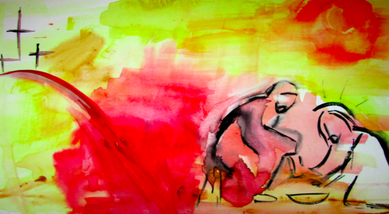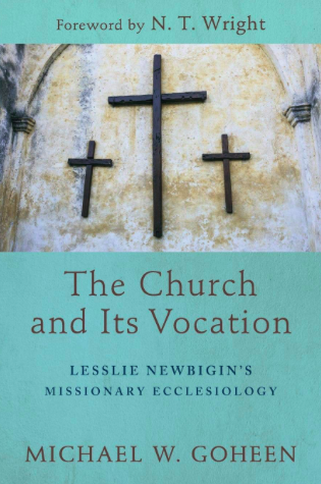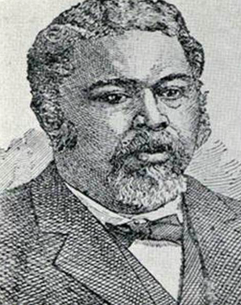My Ego, Not My Potential, Was Offended: A personal reflection on the mind of Christ (Philippians 2)2/20/2019 The following is adapted from my book Destroying Our Private Cities, a lay commentary on Paul's Letter to the Philippian church. I used an abbreviated form of this personal illustration during a recent sermon at Christ Presbyterian Church in The Hill, the church I am privileged to pastor in the Hill community of New Haven, Connecticut. The sermon was on Jesus eat with tax collectors and sinners (from Matthew 9); was used in a presentation on submitting to spiritual authority, the section on "Learning to Imitate Jesus." This illustration is the conclusion to my chapter on "Putting Jesus to Our Potential," an exposition on Philippians 2:5-11 A Menial Job Through my seminary years I worked part‑time to help support my family. My job consisted of the two things I despise more than anything on earth: cleaning and vacuuming. I was a janitor. Already I was a wreck emotionally. The combination of being a nobody at school and a janitor for a daycare center made things worse. I felt I was not fulfilling my potential. One day while cleaning a toilet I got angry at God. Slamming the sponge down into the toilet bowl, I said, “I am a preacher, a teacher. And here I am cleaning toilets!” I protested not getting the church position. I complained about not preaching. My insecurities matched my “unfulfilled potential.” I knew I was dealing with pride, but I thought my complaint was justified because I did have gifts, you know! In the midst of my tantrum, God brought to my mind a sermon illustration I had heard back at college. The preacher recalled the story of a rather well‑to‑do graduate student who finished top of his class with a doctorate. He felt called to the ministry, and a rather prestigious Philadelphia congregation invited him to be their pastor. But the young man felt called to work with William Booth in England. So he left America to apply for a ministry with the Salvation Army. At the interview, Mr. Booth told the young man there was no place for him. His education and wealthy-status would hinder him from taking orders from street preachers, some of them former drunks and prostitutes. But the young man was persistent, and Mr. Booth gave him a try. He sent him to a dark, dingy cellar to clean and shine the muddy boots of the street preachers. After a while, it occurred to the young man that indeed he might be wasting his talents and gifts. “You call yourself a servant of God,” the devil seemed to be saying, “but look at you. You’re squandering all you have to offer.” The man thought of the Philadelphia pulpit he had turned down. But as those thoughts danced in his head, another Voice whispered, “It’s all right. I washed their feet too.” My Ego, Not My Potential, Was OffendedThere at my daycare janitorial job, I realized the issue was pride and my false sense of fulfillment. It was my ego that had been offended, not my potential. Here in the United States we have, now, over 300 million “most important persons in the whole world.” Logic would suggest someone’s potential is going to be sacrificed. The mind of Christ turns this idea right‑side‑up. We must consider that the pursuit of our potential might actually be a disadvantage for others and a hindrance to the gospel. It is not self‑fulfillment but self‑submission that God desires. But you say, “If I give myself to sacrificial obedience, I could be put in a position where I was taken advantage of. I could be used and, even worse, abused.” That possibility exists. And it happens far too often. The solution is not to reject the biblical text and shrink from sacrificial service to others. The solution is to exercise the mind of Christ. Each of us has limited time, energy and resources. We should be selective. The Christ‑hymn of Philippians 2 supplies the appropriate elements for the decision‑making process.
0 Comments
 Lay Christians, along with way too many ministers, read pop-books on Christianity or justice or prayer or church or ministry or missions (i.e., easy to read, little to no exegesis of Bible texts or serious theological thought, good and solid biblical theology nonexistent, often detached from any relevant connection to church history nor connected to any sense of New Testament ecclesiology, and, to be honest, no deep, critical thinking needed and more culturally and socially appealing than truly countercultural and socially upsetting–so, have I offended enough, yet?) . . . there are a number of books I wish (and pray) lay-people would read (try to read, at least . . . take the time . . . they are not easy reading for the most part, but should be attempted, nonetheless) . . . There a plenty of smart and thoughtful and serious lay Christians fully capable of reading these (and that's whom I am specifically targeting here); but the pop-Christian books are so appealing and, thus, are most often relevantly appealing because they affirm our comfortable niché in our world and in modernity (again, offensive, but no apologies) . . . but, still, here is one I have added to that list of should-must-ought to reads: The Church and Its Vocation: Lesslie Newbigin's Ecclesiology by Michael W. Goheen.
If your response is simply, "Amen," to these primer quotes rather than being challenged, made to feel uncomfortable, or having your faith and church life as they are called into questioned . . . you really need to digest the book first . . . than lament and find a way to strengthen your faith . . .
Any (lay-people) up to the challenge? Okay, you pastors, too? My story of the first American Missionary: the moment I realized I was among the privileged2/11/2019
I became a Christian by choice July 10, 1978 on Mountain Home Air Force Base in Idaho. That was a Monday evening. The following weekend I was camping with a small church plant from town that had decided to take the whole church up high into the Rocky Mountains for a weekend retreat. I was invited by workmates that attended the church. That Sunday, after service, I was baptized in the South Fork of the Boise River that ran through the campground, just south of Andersen Ranch Reservoir Dam. It was a Christian & Missionary Alliance church plant. Throughout my early Christian years, I was surrounded by missionaries and missionary stories—told and read. I attended St. Paul Bible College (now Crown College) in Minnesota, where a day didn’t go by that missions, reaching the ends of the earth with the gospel, wasn’t front and center—in the classroom, in chapel, special speakers, missionaries, Miss-Cab Thursday chapel, missionary and deeper-life conferences, and on the walls in the halls of the college building. Stories of the first C&MA missionaries to the Congo, the famed Robert Jaffrey in China, and the names of numerous missionary martyrs filled the air and conversations all over campus. Missions was the air we breathed. We heard more than once about the first American missionaries to leave the continent for a foreign land, giving birth to the modern missionary movement. This mission saturation continued as I moved on to graduate school at Gordon-Conwell Theological Seminary and far into my church ministry years.
Many view this Haystack Prayer Meeting as the event that developed into the modern American missions movement in the subsequent decades and centuries as we have come to know it. We knew their names, those Haystack prayer warriors—Samuel John Mills, James Richards, Robert C. Robbins, Harvey Loomis, and Byram Green—and can recall the American Board of Commissioners for Foreign Missions, which would launch the first American missionaries to leave the continent to bring the gospel to the lost. Never once did I hear the name George Liele. Not once. Herein is the problem—and a hint of what it means to be among the privileged, even as a Christian. Do not read me wrong: I loved my early church experience and I cry and am humbled when I think of my time and friends at St. Paul Bible College (aka Crown College). So many good Christian brothers and sisters, professors and classmates. Yet, why didn’t I hear of George Liele? Because he and his call to missions wasn’t part of our "privileged" heritage, experience, or history. At age fifty-seven, after being a Christian for thirty-six years, I stumbled by Provincial accident onto George Liele, the first American to leave the shores of these United States for an overseas mission field. George Liele was black and a slave. George Liele (1750-1828), actually, was the first person from America to go to another country as a missionary—twenty-three years earlier than the missionaries from the famed Haystack Prayer Meeting. He began his life on a plantation, being born into a slave family owned by Henry Sharpe in Virginia. At the age of 23, in 1773, George became a Christian at the Buckhead Creek Baptist Church. Even as a slave, he became a preacher and traveled with Sharpe great distances to preach at many plantations. In 1775, George earned and paid for his freedom.
of Jamaica. In less than two years, he paid his debt to the Governor and became a free man, once again. George Liele became the first American missionary to another country. He, literally, had to sell it all to do so. After regaining his freedom, George planted a church in Jamaica that would eventually grow to over 300 members. George Liele was probably the first African-American traveling revivalist. It seems that he co-founded the first black Baptist church in America headed by an African-American; in fact, it may have been the first black church in America. Reverend Liele was one of the first and may have been the first ordained African-American Baptist minister (1775), and possibly the first ordained African-American minister in the USoA. More accurately than most have it, George was, however, the first America missionary to go to another country, which makes him the first black American foreign missionary. And, his seventh first, he planted the first black Baptist church in Jamaica. Apparently George Liele will not mind being “last” with all those firsts. But, as for me, being surrounded and saturated in missionary stories from the very beginning, how could I have not been told nor heard of George Liele? This was that moment, my realization that I had indeed lived out my life and, then, my early years as a Christian among and around those who are privileged to write our own history. We left out some things—by intent and by default and by unintended consequences of birth, genealogy, power, and address. Those Haystack college boys, their story stands on it own merits. To God be the glory that these five lit a fire for missions that continues to this day. But, I should have been taught about George Liele, too. In this I was not privileged. I missed out on a powerful example of someone who took Jesus at his word and left it all for the sake of the gospel: “Truly, I say to you, there is no one who has left house or brothers or sisters or mother or father or children or lands, for my sake and for the gospel, who will not receive a hundredfold now in this time, houses and brothers and sisters and mothers and children and lands, with persecutions, and in the age to come eternal life. But many who are first will be last, and the last first.” I should have known about George Liele. Now, you know him.
|
AuthorChip M. Anderson, advocate for biblical social action; pastor of an urban church plant in the Hill neighborhood of New Haven, CT; husband, father, author, former Greek & NT professor; and, 19 years involved with social action. Archives
February 2024
Categories
All
|
Pages |
More Pages |
|

 RSS Feed
RSS Feed